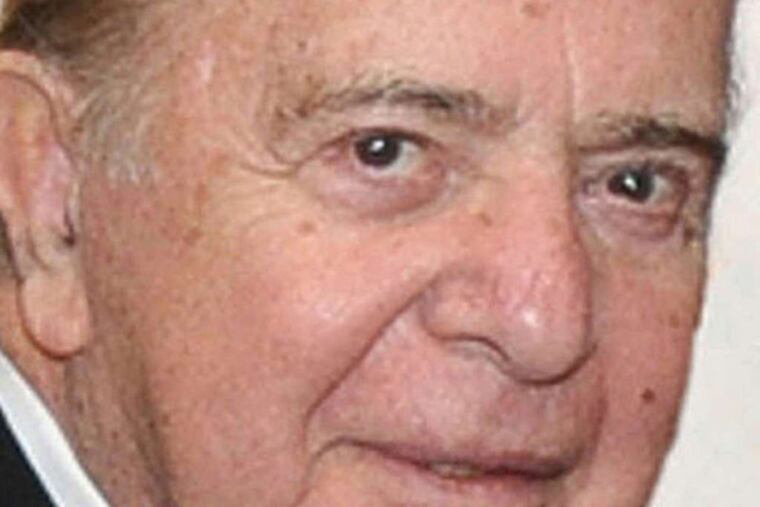Irvin J. Borowsky, 90, philanthropist
Irvin J. Borowsky, 90, of Philadelphia, a television-industry visionary, publisher, and philanthropist, died Tuesday, Nov. 25, of causes related to aging at his home.

Irvin J. Borowsky, 90, of Philadelphia, a television-industry visionary, publisher, and philanthropist, died Tuesday, Nov. 25, of causes related to aging at his home.
In 1948, Mr. Borowsky started TV Digest, a magazine that listed programs for the 50,000 area residents who at that time had TV sets.
He built up the paid circulation to over 300,000 and extended a contract to Channel 6 guaranteeing that if it showed movies - a rarity on TV then - the publication would purchase advertising time on them.
By the time he and his brother Arthur sold the magazine to Walter H. Annenberg in 1952 for $768,000, it was a growth medium. Annenberg, at that time publisher of The Inquirer, would develop it into TV Guide, one of the world's most valuable magazines.
In 1988, Rupert Murdoch's News Corp. paid $3 billion for the company that owned TV Guide. Mr. Borowsky always said he had no regrets over selling the magazine.
"When the 150th person asked me if I had any, I developed an answer," he told Philadelphia Daily News film critic Gary Thompson in 1988. "I said that if regrets would make me any happier, then I'd have them."
The son of Polish immigrants, Mr. Borowsky started a small printing company in South Philadelphia and used it to support his family of eight siblings. He was 14 when his father, Samuel, who sold flour to bakeries, died.
He had spotted an ad for a $5 printing press in Popular Mechanics. It came with type, ink, and instructions. He was hooked.
This first small business - called City Wide Press - laid the foundation for a busy magazine-publishing empire and printing-equipment manufacturing firm.
Mr. Borowsky studied printing at Dobbins Technical High School and attended night school at the Wharton School of the University of Pennsylvania.
In 1946, he founded Foster Manufacturing Co. in Phoenixville, a manufacturer of equipment for printers and publishers.
After he sold TV Digest to Annenberg, Mr. Borowsky started North American Publishing Co. He began buying up niche magazines on sailing, marketing, home remodeling, printing, and other topics, and built up a stable of 24 monthly magazines.
One of these, a trendy nightlife magazine called Cue, he later sold to Murdoch. "When he sold it, it was the leading magazine for New York," said his wife, Laurie Wagman.
According to Sherrie Savett, a lawyer with whom Mr. Borowsky served on several boards, his early business success allowed him to concentrate on his true passions - promoting Jewish causes, tolerance, diversity, interfaith understanding, personal courage, and the nurturing of leaders.
"He believed that every person had the ability to be a hero," Savett said. "He wanted people to recognize the goodness within them and have the courage to act in a responsible fashion in difficult situations."
To make that point, in 2000 Mr. Borowsky founded and developed the National Liberty Museum at 321 Chestnut St. Its programs and exhibits spotlighting diversity and personal courage have been seen by 750,000 students.
"They are received with a message of love," Savett said. "He created that."
Mr. Borowsky was chairman of the printing and publishing divisions of the Federation of Jewish Charities, a forerunner of the Jewish Federation of Greater Philadelphia.
The Borowsky Family Foundation supports various federation initiatives, including the Mitzvah Food Project. In 2010, the Irvin J. Borowsky Campaign to Fight Hunger gave money to buy food and staples for five main pantry sites at Philabundance, the region's largest hunger-relief organization. The support is ongoing, his wife said.
He traveled widely, lecturing on the importance of cooperation among different nations and religions. In 1982, Mr. Borowsky established the American Interfaith Institute, whose aim is to build bridges among Jewish and Christian groups. He wrote 19 books on the institute's work.
One other aim, ultimately achieved, was to press for elimination of any perceived anti-Semitic references from the Bible. The Contemporary English Version of the New Testament published by the American Bible Society does not carry such language.
In 2013 Mr. Borowsky and his wife donated $1 million to Temple University's Tyler School of Art, where the Borowsky Center for Glass Art is housed. He loved glass as a symbol for freedom, calling it fragile and worth protecting.
He supported centers for publishing arts, and for glass as art, at the University of the Arts.
Mr. Borowsky was honored by the Salvation Army, University of the Arts, Printing Industries of America, Ben-Gurion University of the Negev, Foreign Policy Institute, United Way, Alliance of Contemporary Glass Art, and Boys Town Jerusalem.
Recently, he received an honorary degree from Drexel University.
Surviving, besides his wife of 36 years, are sons Scott, Ned, and Ted; daughters Andrea Wagman-Christian, Gwen, and Michele Sokoloff; 13 grandchildren; and two sisters.
Funeral services were Friday, Nov. 28.